As a Filipino home cook dedicated to preserving traditional wellness recipes, I've spent years perfecting this authentic Salabat (Filipino Ginger Tea) recipe. This therapeutic drink has been a cornerstone of Filipino households for generations, and for good reason.
The harmonious blend of fresh ginger's medicinal properties with natural honey creates a powerfully soothing beverage that's particularly cherished during the cooler months. Through countless December mornings, I've found that pairing this warming tea with freshly baked bibingka creates the quintessential Filipino breakfast experience that combines comfort with tradition.
This time-tested recipe delivers the perfect balance of spice and sweetness, offering more depth and potency than commercial alternatives.
Whether you're seeking immune system support, soothing a sore throat, or simply craving a authentic taste of Filipino wellness traditions, this homemade Salabat recipe provides the perfect solution.
Jump to:
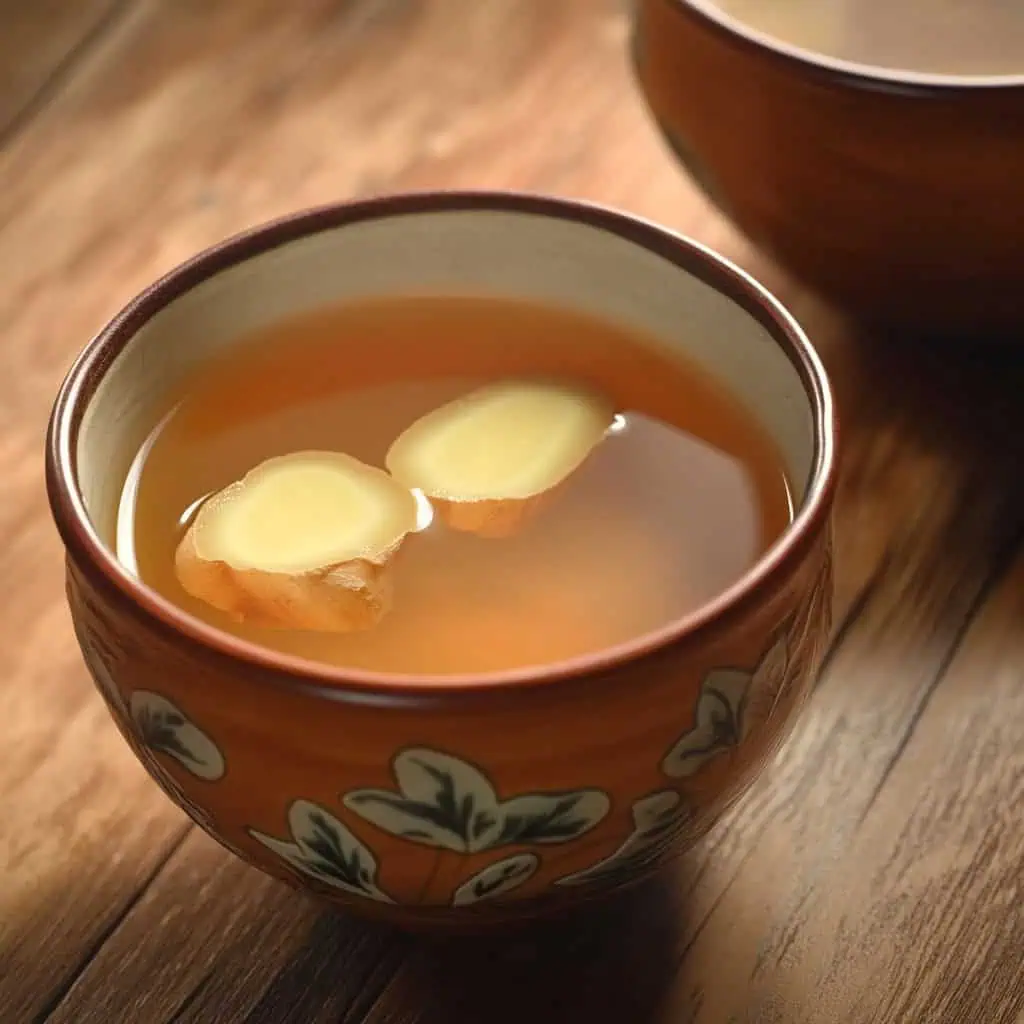
Why You'll Love This Recipe
- Quick & Easy: Ready in just 20 minutes with minimal prep
- Natural Healing: Pure ingredients with proven therapeutic benefits
- Versatile: Enjoy hot or cold, morning or night
- Budget-Friendly: Made with simple, accessible ingredients
- Authentic: A true taste of Filipino traditional medicine
- Customizable: Easy to adjust strength and sweetness
- Immune-Boosting: Natural way to support your health
Ingredients
These ingredients were carefully selected for their perfect synergy in creating authentic Salabat. Fresh ginger forms the foundation with its potent anti-inflammatory compounds and distinctive warming spice.
Water serves as the clean base that extracts ginger's beneficial oils and compounds during simmering. Honey adds natural sweetness while contributing its own antibacterial properties, a traditional combination that enhances both flavor and therapeutic effects.
The optional lemon provides a bright citrus note that balances the spiciness while adding vitamin C, creating a complete wellness package that has sustained Filipino families for generations.
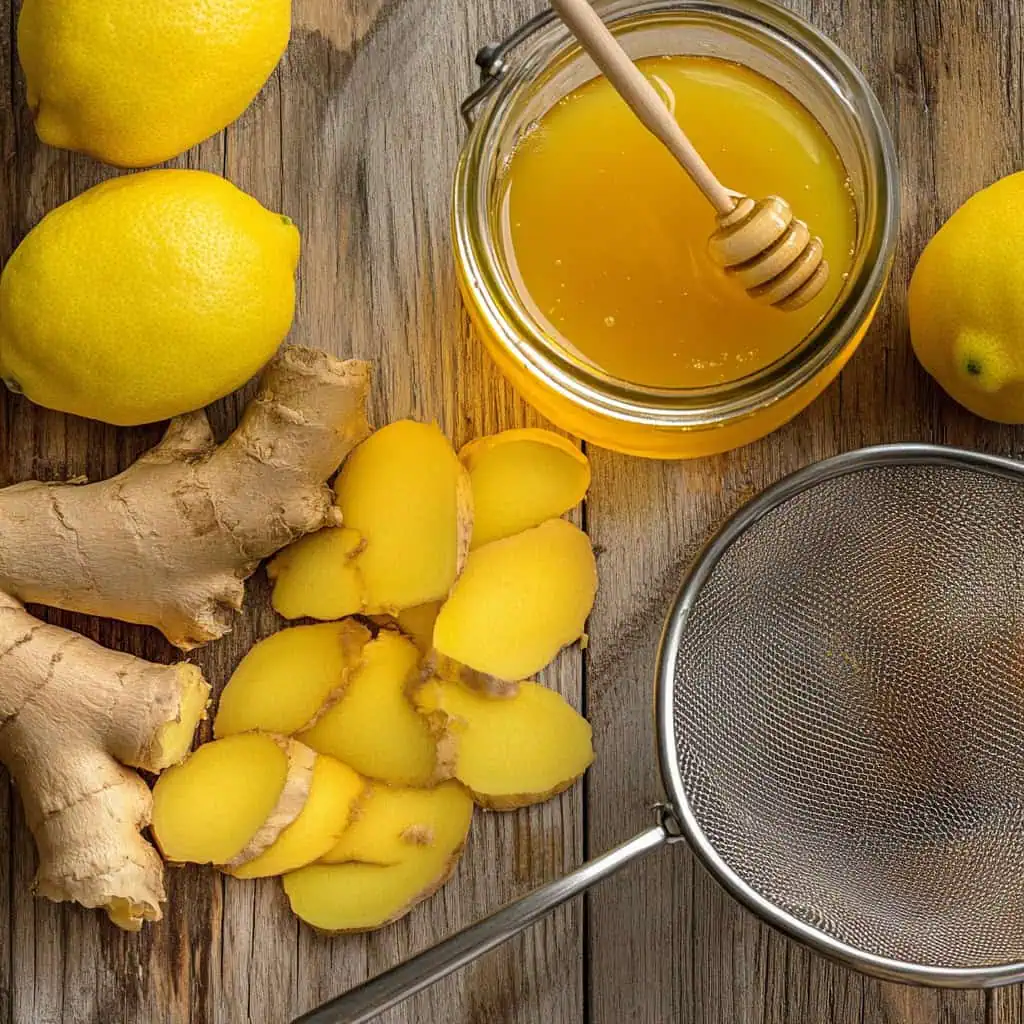
- 6 cups water
- 4 oz fresh ginger (about a 5-inch piece), peeled and sliced into ¼-inch pieces
- ¼ cup honey or sugar
- Optional: Lemon slices for serving
Equipment
- Sharp knife and cutting board - For precisely slicing ginger; a sharp knife reduces the risk of injury when handling the tough ginger root
- Vegetable peeler - For efficiently removing ginger skin while preserving the flavorful flesh
- Medium saucepan or ceramic pot - Ceramic is traditional and helps maintain even heating; stainless steel works well too
- Wooden spoon - For gentle stirring without scratching your cookware
- Fine-mesh strainer - Essential for removing ginger pieces while preserving the clear tea
- Heat-resistant glass measuring cup - For measuring liquids accurately
- Ceramic mugs - Traditional serving vessels that maintain heat longer than glass

How To Make
- Prepare the ginger: Peel the fresh ginger and slice it into thin pieces about ¼-inch thick. For maximum flavor, lightly crush the ginger pieces with the flat side of your knife before slicing to release more oils.
- Combine ingredients: In your saucepan or ceramic pot, combine the water, sliced ginger, and honey.
- Bring to a boil: Heat the mixture over medium-high heat until it reaches a gentle, rolling boil with visible bubbles.
- Simmer gently: Lower the heat to maintain a gentle simmer and cover the pot. Let it steep for 10-15 minutes. The longer it simmers, the stronger the ginger flavor will become, but avoid over-boiling as this can make the tea bitter.
- Strain the tea: Pour the tea through a fine-mesh strainer to remove the ginger pieces. Taste and adjust sweetness if needed by adding more honey.
- Serve: Enjoy hot in ceramic cups. For traditional serving, pair with Filipino rice cakes (kakanin) or pan de sal for a quintessential Filipino breakfast experience.

Tips from Lola's Kitchen
- Ginger preparation matters: Crush ginger slightly before slicing to release more essential oils and flavor
- Use organic ginger when possible for purer flavor and to avoid pesticide residue
- Ceramic or glass cookware preserves the authentic flavor better than metal pots
- Simmer don't boil - Aggressive boiling can make the tea bitter and reduce beneficial compounds
- The skin-on method - Some traditional cooks leave thin-skinned organic ginger unpeeled for extra flavor and nutrients
- Morning ritual - For maximum health benefits, drink your first cup of Salabat on an empty stomach
- Quality honey makes a significant difference in both flavor and therapeutic benefits
- Let steep after simmering - Turn off heat and allow the ginger to continue infusing for even deeper flavor
Substitutions
- Honey → Raw honey (most therapeutic), brown sugar, muscovado, coconut sugar, or stevia for a sugar-free option
- Fresh ginger → Ginger powder in a pinch (1 tablespoon per 6 cups), though fresh is significantly more effective
- Lemon → Calamansi, dayap, or kaffir lime for authentic Filipino citrus notes
- Water → Coconut water for added electrolytes and subtle sweetness
- Plain Salabat → Add turmeric (1-inch piece) for enhanced anti-inflammatory properties
Troubleshooting
- Too spicy? Add more honey or dilute with hot water
- Too sweet? Add more ginger or water, or a squeeze of lemon to balance
- Too weak? Simmer longer or add more ginger; using sliced rather than chopped ginger can also help
- Too strong? Simply add hot water to dilute to your preference
- Cloudy appearance? This is normal and comes from natural ginger oils—the cloudier, the more potent!
- Bitter taste? You may have over-boiled; next time, maintain a gentler simmer
Storage & Reheating
- Refrigeration: Store in an airtight glass container in the refrigerator for up to 5 days
- Freezing option: Freeze in ice cube trays for quick individual servings; add to hot water as needed
- Reheating: Warm gently on the stovetop over low heat or microwave until just hot
- Avoid reboiling: Multiple reheatings can diminish both flavor and health benefits
- Cold Salabat: Refrigerated Salabat can be served over ice for a refreshing summer drink
- Concentrate method: Make double-strength and dilute with hot water when ready to serve for longer storage
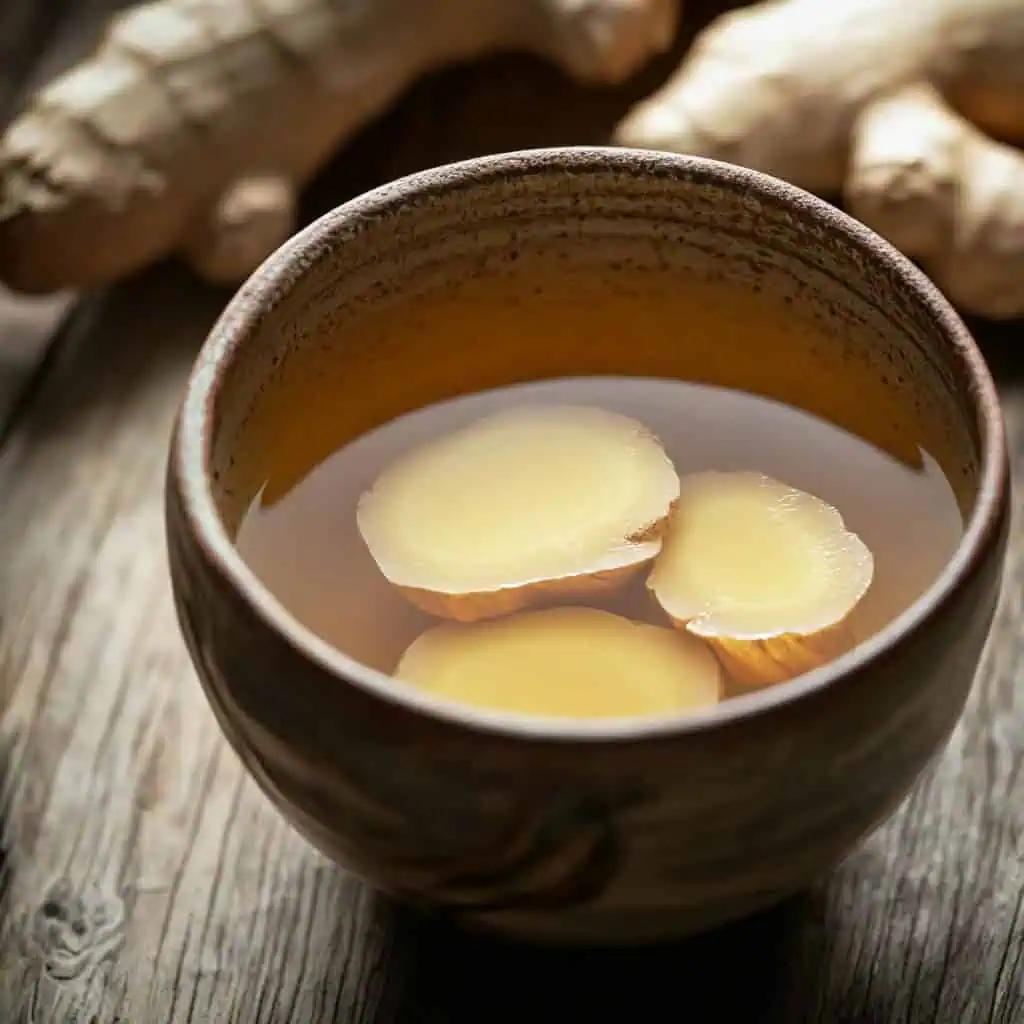
FAQ
Can I make this with powdered ginger?
Yes, though fresh is preferred for maximum potency. Use 1 tablespoon of ginger powder per 6 cups of water. Bloom the powder in a small amount of hot water first to prevent clumping.
Why is my tea cloudy?
This cloudiness comes from natural ginger oils and beneficial compounds. It's actually a sign of potency and doesn't affect the taste or health benefits.
Can I drink this cold?
Absolutely! Refrigerated Salabat served over ice makes a refreshing summer beverage. Many Filipinos enjoy it both ways depending on the season and purpose.
How much should I drink when I'm sick?
For therapeutic purposes, start with 2-3 cups per day. Morning (on empty stomach), afternoon, and before bed creates an effective regimen. Adjust based on your body's response.
Can pregnant women drink Salabat?
While ginger tea is generally considered safe during pregnancy and can help with morning sickness, pregnant women should consult their healthcare provider first. If approved, start with a weaker brew and limit to 1-2 cups daily.
How can I make my Salabat stronger for medicinal purposes?
Double the ginger amount and extend simmering time to 20 minutes. For severe cold symptoms, add crushed garlic, cayenne, and extra honey.
Is Salabat good for weight loss?
Many find it helpful as part of a weight management program. The thermogenic properties of ginger can temporarily boost metabolism, while its digestive benefits support gut health.
Can children drink Salabat?
Yes, but prepare a milder version with less ginger and more honey. Start with small amounts to ensure they tolerate the spiciness. Many Filipino families introduce diluted Salabat to children from a young age.
How is Salabat different from regular ginger tea?
Salabat traditionally uses a higher ratio of ginger and longer simmering time than typical Western ginger tea, creating a more potent, therapeutic brew deeply rooted in Filipino healing traditions.
What are the main health benefits of Salabat?
Regular consumption supports immune function, soothes sore throats, aids digestion, reduces inflammation, improves circulation, and may help manage nausea. The extensive traditional use of Salabat has been increasingly validated by modern scientific research on ginger's bioactive compounds.
Related
Looking for other recipes like this? Try these:
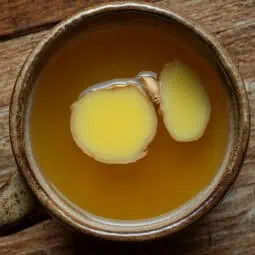
Salabat: Traditional Filipino Ginger Tea (Fresh Homemade Recipe)
Ingredients
- 6 cups water tubig
- 4 oz fresh ginger luya, peeled and sliced into ¼-inch pieces (about 5-inch piece)
- ¼ cup honey pulot or sugar (asukal)
- Optional: Lemon slices hiwa ng dayap
Instructions
- Begin by peeling the fresh ginger (balatan ang luya) and slice it into thin pieces about ¼-inch thick (hiwain ng manipis). For maximum flavor, lightly crush the ginger pieces before slicing to release more oils. Prepare your honey (pulot) or sugar (asukal) and have all ingredients ready beside your cooking area.
- In a saucepan or preferably a ceramic pot, combine 6 cups of water (tubig), the sliced ginger, and honey. Bring the mixture to a boil over medium-high heat (pakuluan sa katamtamang init). The water should have visible bubbles but not be violently boiling.
- Once boiling, lower the heat to maintain a gentle simmer (pahinaan ang apoy) and cover the pot. Let it steep for 10-15 minutes (hayaang kumulo ng 10-15 minuto). The longer it simmers, the stronger the ginger flavor will become, but avoid over-boiling as this can make the tea bitter.
- Strain the tea (salain ang tsaa) through a fine-mesh strainer to remove the ginger pieces. Taste and adjust sweetness if needed by adding more honey. For extra flavor, you can add a slice of lemon (dayap) or calamansi.
- Serve the salabat hot in small ceramic cups (ihain ng mainit). For traditional serving, pair it with Filipino rice cakes (kakanin) or pan de sal for breakfast. During illness, drink 2-3 cups daily or as needed for therapeutic benefits.
- If storing, let it cool completely and keep in an airtight glass container in the refrigerator for up to 5 days. When reheating, warm gently on the stovetop or in the microwave - avoid reboiling multiple times as this can affect the flavor and benefits.
Tips from Lola's Kitchen
- Crush ginger slightly before slicing to release more flavor
- Use ceramic or glass pots instead of metal when possible
- Don't over-boil as it can make the tea bitter
- Add pandan leaves for extra aroma
- Try adding calamansi instead of lemon for a more Filipino twist
Nutrition
The Story Behind Salabat (Traditional Filipino Ginger Tea)
Long before modern medicine lined pharmacy shelves, Filipino households relied on the powerful healing properties of salabat, a traditional ginger tea that has been a cornerstone of Filipino wellness for centuries. This aromatic brew, known locally as "sa-LA-bat," traces its origins to pre-colonial Philippines, where indigenous healers recognized ginger's potent medicinal properties.
In the mountainous regions of the Cordilleras, particularly in Benguet, salabat became more than just a remedy—it evolved into a cultural symbol of care and hospitality. Local farmers would start their day with a steaming cup of this invigorating tea, believing it provided the strength needed for their labor-intensive work in the terraced rice fields. The high altitude and cool climate of these regions made salabat an essential part of daily life.
During the Spanish colonial period, salabat's popularity spread throughout the archipelago, with each region adding its own twist to the basic recipe. Some areas incorporated local citrus fruits like calamansi, while others added indigenous herbs such as pandan or lemongrass. The Spanish documented the Filipinos' use of salabat for treating various ailments, from digestive issues to respiratory problems.
Today, salabat remains deeply woven into the fabric of Filipino culture. It's a common sight in Filipino households during the cold and rainy season, often served alongside traditional merienda snacks. Street vendors, known as magsasalabat, still roam some neighborhoods, especially during the early morning hours, carrying thermoses of this comforting brew. The distinctive call of "Saaaaaa-labat!" has become a nostalgic sound for many urban dwellers.
Modern science has validated what Filipino ancestors knew all along—ginger contains powerful compounds like gingerols and shogaols that possess anti-inflammatory, antimicrobial, and antioxidant properties. This scientific backing has led to a resurgence of interest in salabat, with many young Filipinos rediscovering this traditional remedy as a natural alternative to over-the-counter medicines.
Whether it's soothing a sore throat before a singing performance, calming an upset stomach, or simply providing comfort on a rainy day, salabat continues to be passed down through generations as both a remedy and a reminder of Filipino heritage. Its enduring presence in Filipino culture speaks to the timeless wisdom of traditional healing practices and the deep connection between food, medicine, and family in Filipino society.
As global interest in natural remedies and wellness beverages grows, salabat is gaining recognition beyond Philippine shores, earning its place alongside other celebrated healing teas. Yet for Filipinos, it remains something more personal—a warm embrace in a cup, a mother's care in liquid form, and a taste of home that connects them to their roots and traditions.


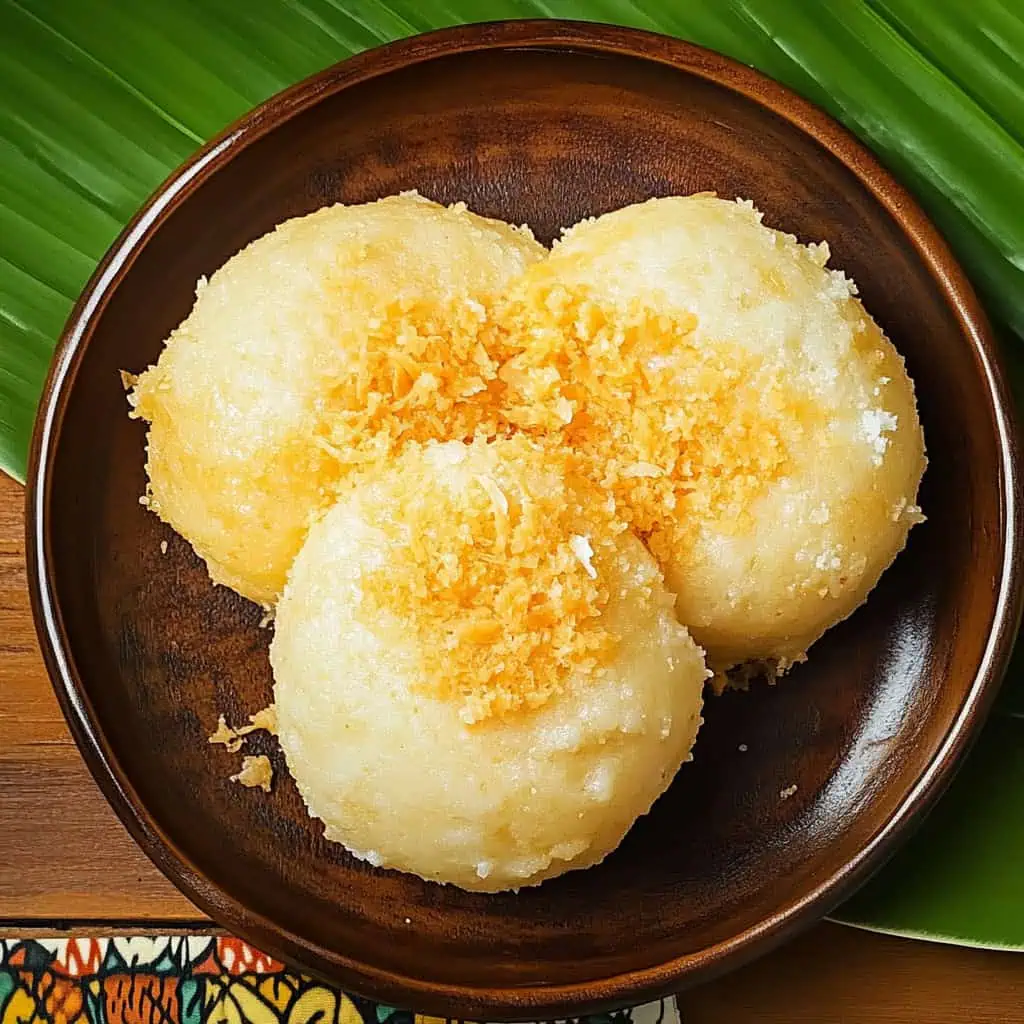
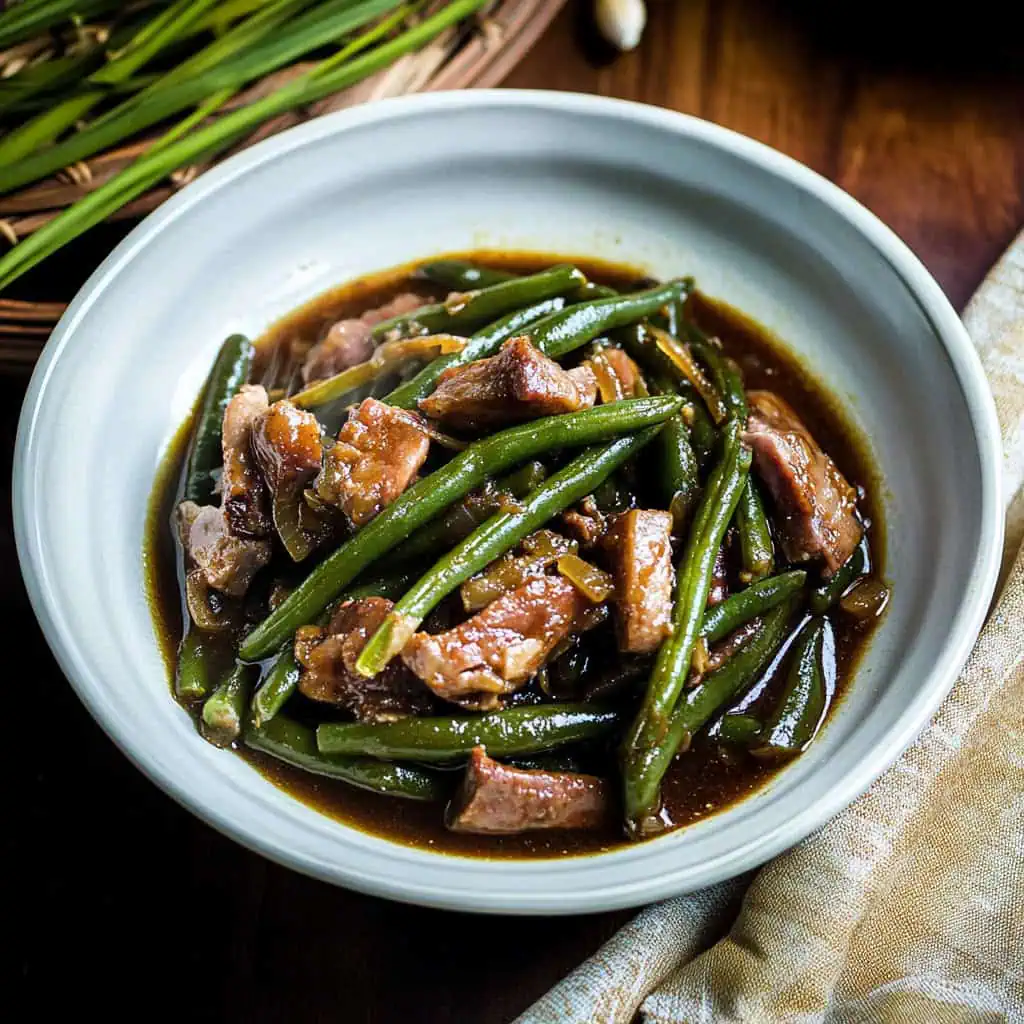
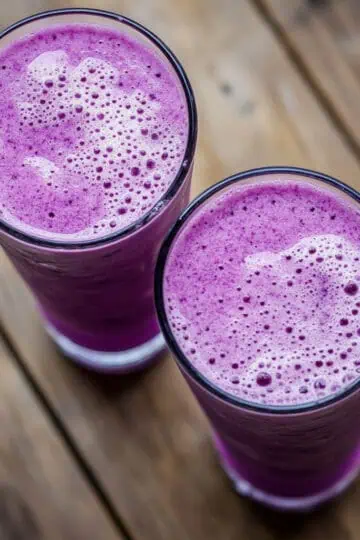
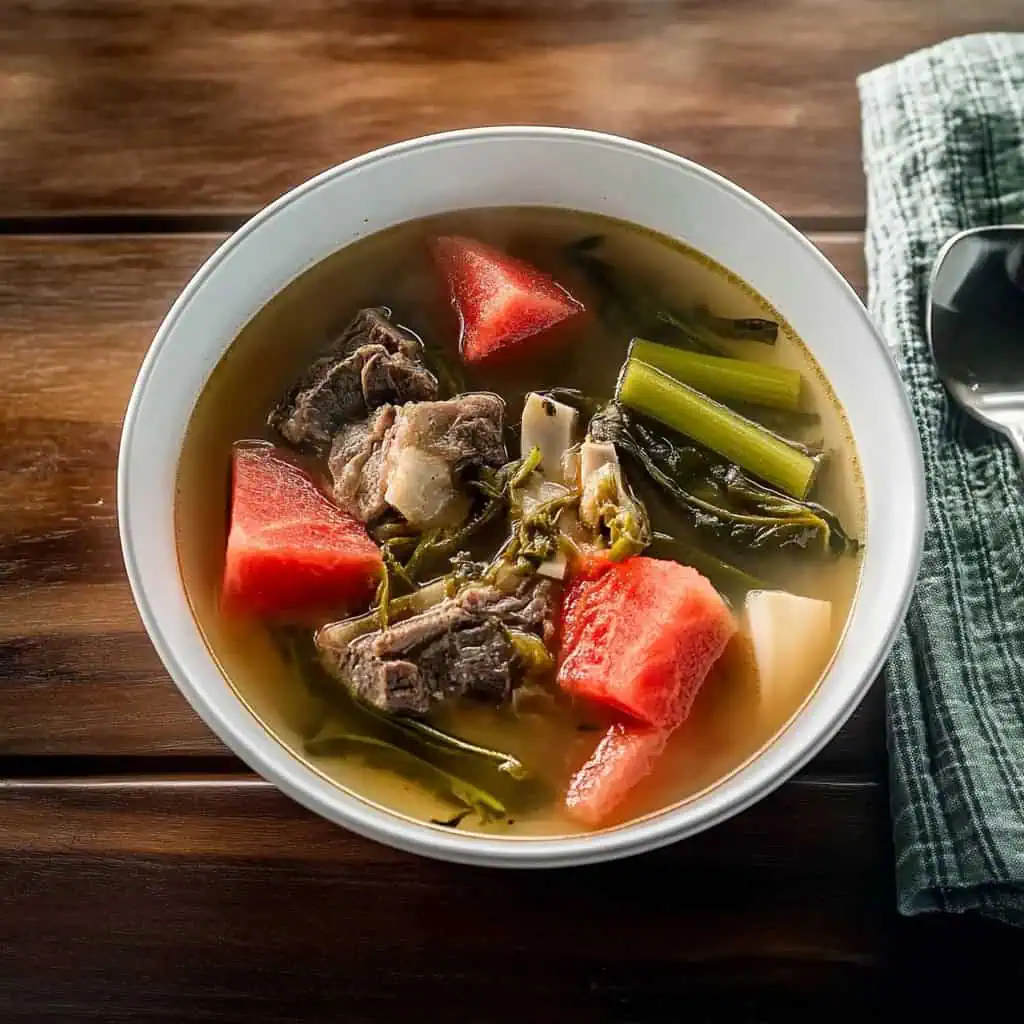




Comments
No Comments